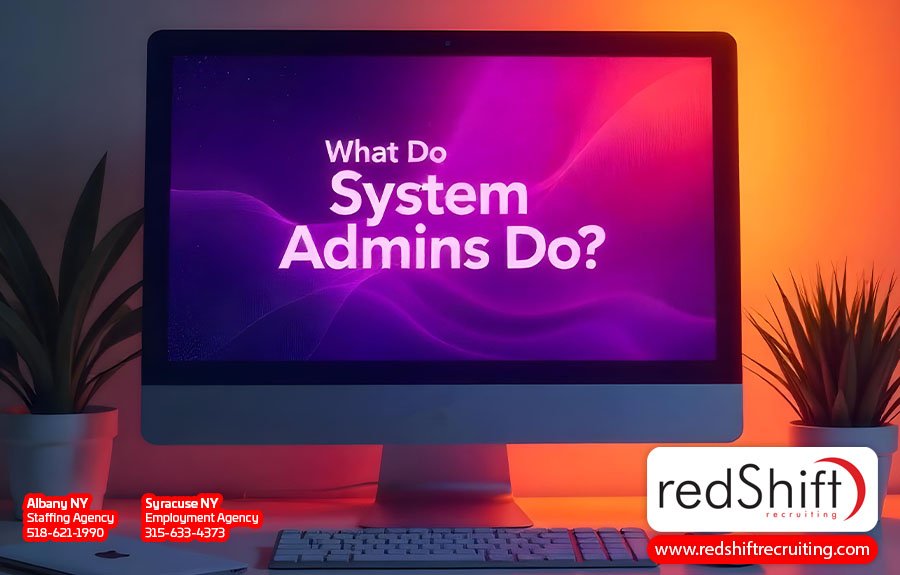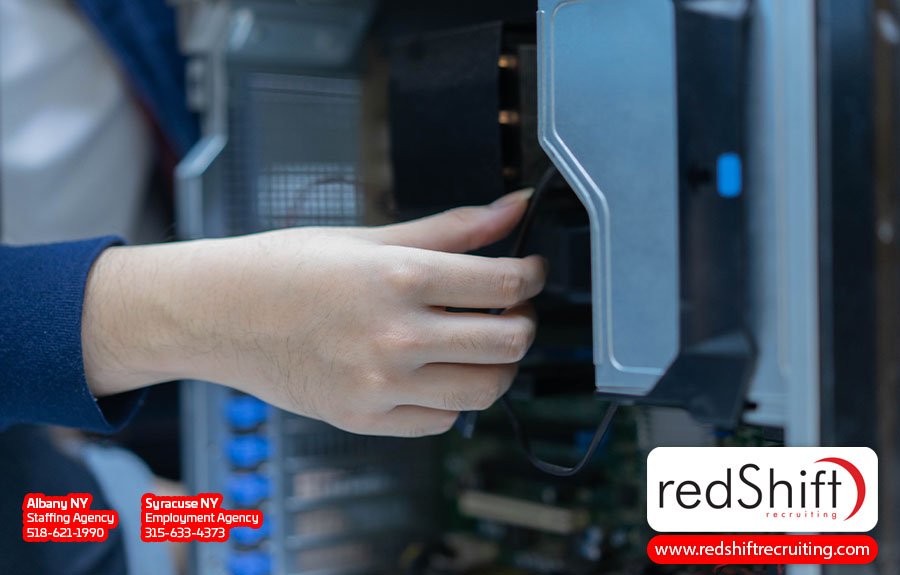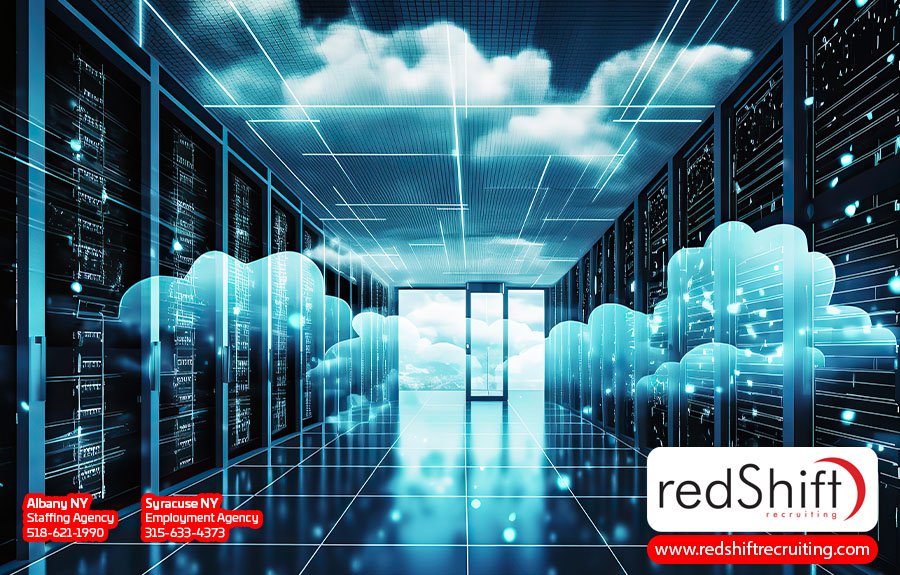What Do System Admins Do and Why Do You Need Them?
Every successful modern business runs on technology, and system administrators are the experts who keep that technology performing at its peak. What do system admins do? System administrators are the critical link between complex technological infrastructure and business functionality, managing the intricate networks, servers, and systems that keep your organization running smoothly. From network security and system performance to cloud migration and disaster recovery, these professionals transform technological challenges into opportunities for enhanced efficiency, security, and competitive advantage. This article will delve into the key responsibilities of system administrators, how their role differs from other IT specialists, the business benefits of hiring them, and tips for employers seeking top talent in this field.
Core Responsibilities of System Administrators
System administrators, often referred to as sysadmins, play a crucial role in an organization’s IT operations, ensuring technology systems are secure, reliable, and optimized for business needs. The exact scope of a system administrator's role can vary by company size and structure. In smaller organizations, sysadmins may oversee a wide range of tasks, while in larger companies, their responsibilities may focus on specific areas, which often include collaborating with specialized teams. While their tasks can vary depending on the size and structure of the organization, they typically include the following:
Network Administration
Systems administrators manage the network infrastructure, ensuring systems stay connected and perform efficiently. This includes fixing connectivity issues, optimizing network performance, and maintaining the hardware and software that support the network. Their work is a key part of network management, which involves overseeing and coordinating all aspects of a business's networking systems to ensure reliability and scalability.
Server Management
Servers are the backbone of IT operations, and sysadmins are responsible for ensuring they run reliably. They maintain computer servers by installing updates, monitoring performance, and troubleshooting to prevent downtime.
Data Backup and Recovery
Protecting data is critical for any business, making this a key aspect of the system administrator role. Sysadmins handle data backups, develop recovery plans, and respond quickly to minimize damage from hardware failures, cyberattacks, or unexpected events. They also conduct regular testing and updates of disaster recovery plans to ensure they remain effective as risks change.
Security Management
Sysadmins play a key role in security management, particularly in smaller organizations where dedicated cybersecurity teams may not exist. Their tasks include assisting with implementing security protocols, managing firewalls, and ensuring compliance with company policies. In larger organizations, sysadmins often collaborate with cybersecurity professionals, focusing on operational support to safeguard sensitive data and address vulnerabilities.
Database Management
Many systems administrators support database management by troubleshooting performance issues and maintaining operational efficiency. However, database administrators (DBAs) typically handle more complex tasks like database design and advanced optimization.
Cloud Systems Management
In the era of cloud computing, many sysadmins are responsible for configuring and maintaining cloud systems, managing migrations to the cloud, and ensuring the security of cloud-based infrastructure. Their role is critical for businesses adopting hybrid or cloud-first strategies.
System Performance Monitoring
A system admin uses specialized tools to monitor the health of IT systems. By monitoring system performance, they identify bottlenecks, prevent system slowdowns, and ensure everything operates smoothly.
User Account Management
Creating, managing, and troubleshooting employee access to IT systems is another core responsibility. Sysadmins oversee managing user accounts, setting permissions, and resolving access problems to maintain security while ensuring functionality.
Software and Hardware Installation
From onboarding new employees to upgrading systems, a systems administrator installs, configures, and maintains IT hardware, software, and operating systems. Regular maintenance and timely updates ensure that these tools meet the business’s needs and continue to run reliably.
Technical Support
When IT issues escalate beyond routine troubleshooting, sysadmins step in. These professionals excel at providing technical support for more complex problems, helping teams stay productive with minimal disruption.
Modern Trends and Collaboration
With the rise of DevOps practices, sysadmins increasingly collaborate with development teams to streamline workflows and improve system agility. They also leverage automation tools and scripting to simplify tasks like deployment, scaling, and monitoring, improving overall efficiency. Additionally, as technology evolves, system administrators and other IT professionals must adapt. Advances in AI, automation, and edge computing are redefining traditional roles, creating exciting opportunities for sysadmins to expand their skills.
No matter the size of a company, having a skilled systems administrator is essential. And as companies embrace technologies like cloud computing, automation, and DevOps, the role of the sysadmin is changing to meet new demands. Their deep knowledge of system administration, network management, database management, and performance monitoring helps organizations stay efficient, secure, and ready to adapt to changing industry trends and business requirements.
Related IT Administrative Roles
Sysadmins are problem-solvers who frequently touch on multiple aspects of IT, making them essential in smaller companies that rely on one person to manage a wide range of tasks. But while system administrators play a central role in managing a company’s computer hardware and software, they aren’t the only IT professionals tasked with maintaining critical systems. In larger organizations, systems administrators typically collaborate with specialists like network administrators or cloud administrators to handle more complex systems. Understanding how these roles differ (and where they overlap) can help employers effectively assess their hiring needs and identify professionals with the right skillsets to meet their business requirements.
Network Administrators
Network administrators focus exclusively on maintaining an organization’s network infrastructure. They manage network file systems, fix connectivity problems, and optimize network performance to ensure seamless communication and data sharing. While a sysadmin may assist with basic network tasks, a network administrator brings specialized skills that are critical for handling large or complex networks. Their expertise in network management ensures reliability and scalability.
Database Administrators
A database administrator (DBA) is responsible for managing an organization's data. They design, optimize, and maintain databases, ensuring data remains accessible, secure, and uncorrupted. While sysadmins might help with minor database tasks, DBAs focus solely on databases, offering advanced knowledge for managing large datasets or complex database systems.
Cloud Administrators
The rise of cloud computing created new roles for cloud administrators, who oversee cloud-based platforms like AWS, Azure, and Google Cloud as well as manage virtual machines and other virtualized resources to ensure scalability, efficiency, and security. Sysadmins may handle basic cloud integration, but cloud administrators specialize in maintaining and optimizing these environments.
DevOps Engineers
DevOps engineers bridge development and operations, focusing on infrastructure as code, automation, and continuous integration. Sysadmins often collaborate with DevOps teams to enhance agility and streamline IT processes.
Security Administrators
Security administrators specialize in protecting IT systems from cyber threats by implementing firewalls, security protocols, and antivirus tools. In larger organizations, they work alongside sysadmins, who handle routine security measures like user access controls and updates.
IT Help Desk Technicians
Help desk technicians provide first-tier support for employees, with systems administrators stepping in for escalated issues requiring deeper expertise. In smaller companies, sysadmins may also perform some help desk tasks.
Overlap and Collaboration
In smaller companies, a systems administrator may take on multiple responsibilities, from managing networks to assisting with cloud integration or handling security tasks. However, larger businesses often hire dedicated specialists for each role, with sysadmins acting as a bridge between teams to ensure the entire IT infrastructure operates smoothly.
Business Benefits of Hiring System Administrators
Bringing a skilled system administrator onto your team can have significant benefits for your business. By ensuring the smooth operation of your organization's computer systems, sysadmins help reduce downtime, streamline processes, and keep everything running efficiently. They proactively manage computer networks, resolve potential issues before they escalate, and optimize performance, allowing employees to stay productive by preventing frustrating and time-consuming IT disruptions. This well-maintained infrastructure not only boosts productivity but also improves employee morale and satisfaction.
Sysadmins also contribute to network security by implementing basic security policies, such as managing user access and keeping systems updated with the latest patches. For more advanced security needs, such as protecting against sophisticated cyber threats or ensuring compliance with detailed regulations, a systems administrator often collaborates with security professionals or dedicated cybersecurity teams. This partnership ensures that your IT infrastructure remains protected on all fronts while helping your business avoid the legal and financial consequences of security failures.
When it comes to disaster recovery, sysadmins are critical to ensuring quick restoration after unexpected events like hardware failures or cyberattacks. They develop and oversee operational recovery plans, addressing issues promptly to minimize downtime. In larger organizations, they often work alongside storage specialists or IT strategists to implement more robust, long-term recovery solutions. Their efforts help prevent costly downtime and protect against data loss, saving businesses significant financial and operational resources.
As businesses grow, system administrators bring the technical expertise needed to scale IT systems effectively. They ensure smooth network operations, integrate new technologies, and enable flexibility through initiatives like transitioning to cloud systems or improving remote work capabilities. Their ability to adapt IT systems to emerging technologies helps future-proof the organization, keeping it competitive even as the field changes. Additionally, sysadmins provide valuable insights into IT strategy, supporting scalability and long-term planning by recommending upgrades and aligning technology with the company’s goals.
While hiring a systems administrator requires an investment, the long-term benefits far outweigh the costs. A dedicated sysadmin can provide technical support, prevent costly system failures, and reduce reliance on emergency fixes. Compared to outsourcing IT services, an in-house sysadmin offers tailored solutions that match your organization’s specific needs, often delivering better value over time by protecting IT systems, driving innovation, and ensuring compliance.
Hiring Advice for Employers
Before you start recruiting, take time to clearly define your IT needs. System administrator roles can vary widely, so you'll need to identify whether you need a generalist or someone with specialized expertise in areas like security, scalability, or virtualization. A detailed job description will help attract candidates who fit your requirements, while incorporating practical assessments and scenario-based questions into the interview process will help you assess both technical knowledge and problem-solving abilities in real-world situations.
When evaluating candidates, review their experience, educational background, and certifications to ensure they meet the job’s requirements. Many system administrators hold a bachelor's degree in computer science, information systems, or a related field, though practical experience often weighs more heavily in hiring decisions. Look for candidates with hands-on experience managing complex IT environments and troubleshooting critical issues. Certifications like CompTIA Server+, CompTIA Security+, Microsoft Certified: Azure Administrator Associate, Cisco Certified Network Associate (CCNA), or AWS Certified SysOps Administrator can demonstrate a commitment to professional growth while providing additional assurance that the candidate has the skills necessary to excel in the role.
Keep in mind that a good system administrator will balance technical skills and soft skills. The right candidate should have expertise in areas like server management, network operations, and cybersecurity, while also being adaptable to new technologies. Their experience should align with your company’s needs, whether it involves managing cloud systems, on-premise infrastructure, or hybrid environments. Look for proficiency in managing servers and computer networks, configuring and maintaining access controls, and implementing basic security measures such as patching and monitoring. A strong candidate should also have experience ensuring system reliability, maintaining backup strategies and recovery protocols, and working with tools like antivirus software to protect IT infrastructure. Familiarity with network protocols, firewalls, and overall security best practices is beneficial, especially in smaller organizations where system administrators may wear multiple hats. Additionally, prioritize candidates who demonstrate a proactive approach to security by staying updated on the latest threats and IT trends.
Equally important are interpersonal skills like effective communication, problem-solving, teamwork, and the ability to stay organized under pressure, as system administrators must collaborate across departments and explain technical issues to non-technical stakeholders. Communication skills are particularly vital, as these professionals are often the bridge between technical teams and other parts of the organization, translating complex IT concepts into actionable insights. A system administrator with strong communication abilities is better equipped to align IT systems with your company’s broader goals, making them an indispensable part of your team.
Cultural fit is another crucial factor, as a systems administrator who aligns with your company’s values and workflows is more likely to work effectively with your existing team. Look for signs of emotional intelligence, such as how they handle pressure or interact during the hiring process, as these traits are critical for managing high-stakes situations and building strong working relationships.
Once you’ve found the right person, invest in their ongoing development. Technology evolves rapidly, and continuous learning is vital to keep up in the IT field. Encourage them to pursue IT certifications in fields like cyber security, cloud computing, or virtualization to stay ahead of industry trends. Supporting their growth not only strengthens your IT infrastructure but also shows your commitment to their career, which can boost retention, but to keep top talent engaged, you'll also need to provide opportunities for career progression. Whether through leadership roles, expanded responsibilities, or specialization in areas of interest, showing a clear path for advancement helps foster loyalty and motivation. Pair these opportunities with competitive pay and benefits to attract and retain the best talent in a competitive job market.
Future of System Administration
As emerging technologies like cloud computing, artificial intelligence (AI), and automation change how businesses operate, system administrator roles are also changing. Automation tools are streamlining repetitive tasks such as patch management and system monitoring, while AI enables predictive maintenance and smarter anomaly detection. To stay competitive, system administrators must develop the skills that are becoming integral to modern IT environments, such as automation, scripting, and cloud-native technologies like containerization and serverless computing.
The growing adoption of cloud systems and the rise of edge computing are further reshaping how sysadmins manage IT infrastructure, requiring them to oversee hybrid environments and ensure seamless integration between edge devices and centralized systems. DevOps practices are also redefining the role, making it necessary for systems administrators to collaborate more closely with developers, cybersecurity teams, and data scientists. This shift emphasizes the need for strong teamwork, adaptability, and cross-disciplinary knowledge.
As cyber threats grow more sophisticated, cyber security is taking on even greater importance, and the systems administrator plays an essential part in managing firewalls, deploying intrusion detection systems, and implementing encryption protocols. Staying updated on the latest vulnerabilities and maintaining proactive security strategies will continue to be critical to protecting businesses from new and changing threats.
Even as automation and other technologies transform the field of systems administration, the human element remains indispensable. System administrators are responsible for essential tasks that require human skills and experience, including providing key oversight, troubleshooting complex problems, and adapting automated processes to unique business needs. Additionally, as businesses focus more on sustainability, sysadmins are tasked with optimizing resource usage and implementing energy-efficient IT practices to reduce environmental impact.
These technological advances are not only changing business operations but also altering the role of system administrators. Hiring professionals who can leverage emerging technologies and embrace new responsibilities will continue to be essential for businesses seeking to drive success and ensure their information technology systems are effective and efficient.
Frequently Asked Questions
How Do System Administrators Handle Security Threats and Protect Company Data?
System administrators play a critical role in protecting company data and systems from security threats. They implement firewalls, monitor for unusual activity, and ensure security patches are applied promptly. Admins enforce best practices like multi-factor authentication, secure password policies, and regular user training to reduce risks. They also collaborate with IT security teams to address vulnerabilities, back up critical data, and create incident response plans to minimize damage in case of a breach. Staying informed about emerging threats and security trends is key for these professionals to effectively defend their company’s systems and data.
What Is the Difference Between a System Administrator and an IT Support Technician?
While both systems administrators and IT support technicians contribute to IT operations, their responsibilities differ significantly. A system administrator manages core infrastructure like servers, operating systems, and networks, ensuring smooth and secure system performance. They handle complex tasks like backups, system upgrades, and security protocols. In contrast, an IT support technician focuses on assisting end users, troubleshooting hardware and software issues, and ensuring day-to-day IT problems are resolved. IT support technicians often escalate advanced issues to system administrators for resolution.
How Do System Administrators Stay Up-To-Date With the Latest Technologies and Trends?
Continuous learning is essential for system administrators to stay ahead in a rapidly changing field. For many, this involves activities such as attending industry conferences, participating in webinars, and taking online courses to sharpen their skills. Certifications, such as CompTIA Server+ or AWS SysOps Administrator, help validate expertise in emerging technologies, while staying active in professional forums and networking groups also provides valuable insights. Additionally, setting up personal lab environments allows system administrators to experiment with new tools and concepts in a hands-on way.
What Certifications Are Relevant for System Administrators?
Certifications are a valuable way for system administrators to showcase their skills and stay competitive in the job market. Popular options include CompTIA Security+, CompTIA Server+, and Cisco Certified Network Associate (CCNA) for foundational knowledge. For cloud-focused roles, certifications like AWS Certified SysOps Administrator or Microsoft Certified: Azure Administrator are highly relevant. Advanced certifications, such as Red Hat Certified Engineer (RHCE), can also enhance credentials. Employers value these certifications because they demonstrate expertise in managing diverse IT systems and keeping them secure.
What Are the Future Trends and Opportunities for System Administrators?
The role of system administrators is changing as new technologies like cloud computing, automation, and AI reshape IT operations. Admins are increasingly expected to manage hybrid environments, combining on-premise systems with cloud services, while automation tools are becoming integral, allowing them to focus on strategic initiatives instead of repetitive tasks. There’s also a growing emphasis on cybersecurity, requiring sysadmins to strengthen their skills in threat detection and response. With businesses relying more on IT infrastructure, demand for system administrators is likely to remain strong, offering long-term career opportunities for those who adapt to these changes.
Conclusion
The fast-moving nature of the information technology field and the indispensable role of technology in modern business operations demands more than just basic IT support—it requires strategic, forward-thinking professionals who understand how to manage and adapt complex systems while ensuring security, performance, and reliability. The role of the system administrator is essential for maintaining smooth operations and adapting to new technological challenges. By investing in skilled system administrators, organizations gain more than just technical expertise; they acquire critical partners who protect, optimize, and drive technological innovation.
Article Author:
Ashley Meyer
Digital Marketing Strategist
Albany, NY






